Answer these simple questions and we will find you the BEST prices
Which type of solar quotes do you need?
It only takes 30 seconds
100% free with no obligation

Get up to 3 quotes by filling in only 1 quick form

Compare quotes and find yourself the best deal

Increase the value of your home by installing a new boiler
- Householdquotes.co.uk
- Central Heating
Central Heating Systems Explained: A Comprehensive Guide

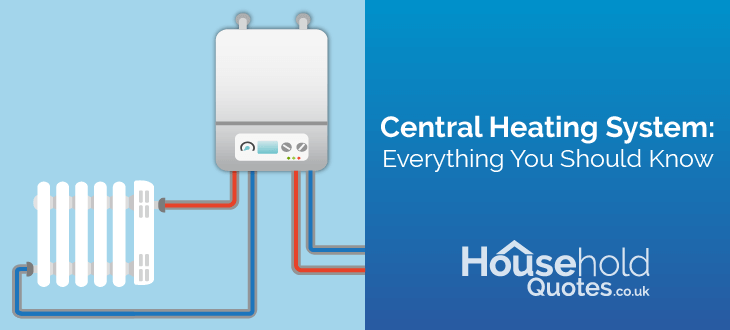
- A central heating system provides heat to an entire building from a single point
- The average cost to install gas central heating ranges between £4,000–£7,500
- A modern central heating system ensures efficient heating, lower energy bills, and better air quality.
Central heating isn't only about radiators. In fact, it's a complex system that orchestrates comfort throughout your home by regulating temperature and ensuring a cosy ambience.
Each part plays a vital role in maintaining a pleasant environment. From the boiler that produces heat to the pipes that distribute it and the thermostat that acts as the control centre.
In this article, we'll have the central heating system explained so that you can make the most informed decisions for a cosier and more energy-efficient home.
If you're ready to invest in a central heating system for your home, you will need an installer you can trust. Yet, searching for an experienced installer can march on for days if done alone. We bet this is not the kind of chore you'd want to do in your spare time.
Thankfully, Household Quotes can simplify your searches. Fill out our 30-second form and we'll connect you with up to 3 thoroughly vetted heating engineers near you. Our service is free and doesn't bind you to place any orders. Click below to begin!
- Quotes from local installers
- Payment by finance available
- Save up to £975
It only takes 30 seconds

- What is a central heating system?
- Types of domestic central heating systems in the UK
- How does a central heating system work?
- Costs of a central heating system for your home
- Environmental impact of your central heating system
- Central heating installation and maintenance
- When do you need a new central heater system?
- FAQ
What is a central heating system?
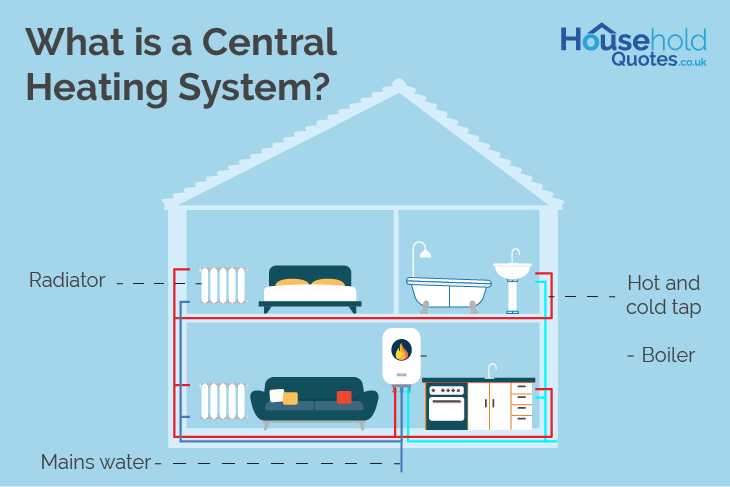
Generally speaking, a central heating system is a system that heats a building by circulating heated air or water throughout the structure. It consists of a central unit, such as a boiler, that produces heat and a network of pipes that distribute the heat to radiators, or underfloor heating.
Central heating systems are typically used in modern buildings and homes. However, the history of domestic heating systems in the UK dates back to the 18th century.
In the early 19th century, central heating gained popularity in large buildings. But it wasn't until the late 19th and early 20th centuries that it became widely adopted in homes.
Factors like improved boilers, the rise of the middle class, and suburban living contributed to this shift. By the mid-20th century, central heating in the UK became standard. Finally, in the 1950s, the introduction of gas-fired boilers further accelerated its adoption due to gas being a more affordable and efficient fuel option than coal or oil.
Types of domestic central heating systems in the UK
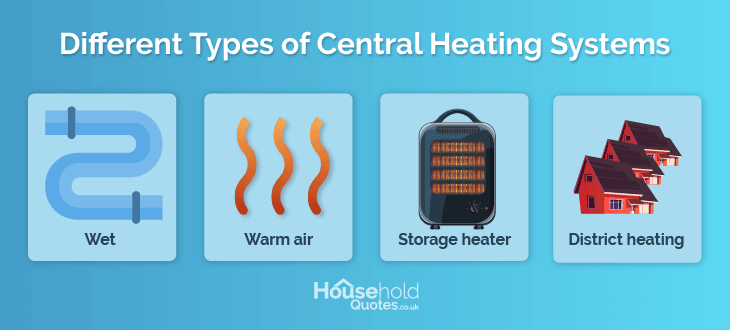
Wet system
A wet system, also known as a hydronic system, is the most common type of central heating system in the UK. With boilers being a typical representative, a wet system uses hot water or steam to warm up a building. The hot water or steam circulates through a network of pipes to radiators or underfloor heaters, which transfer the heat to the surrounding air.
Wet systems are efficient and can heat large areas. Also, they are relatively quiet and can be zoned to control the temperature in different parts of the building.
Warm air system
Warm air systems are less efficient than wet systems, but they can be more comfortable in humid climates. They are also relatively noisy and cannot be zoned as easily as wet systems.
Storage heater system
A storage heater system heats water or sand during off-peak hours and then releases the heat during the day. Storage heater systems are inexpensive to run, but they can be slow to heat up and may not provide constant heat.
They are also not very efficient in terms of space use, as they require large storage tanks.
District heating system
A district heating system uses a central boiler to heat water or produce steam. It then distributes to individual buildings through a network of pipes. District heating systems are very efficient, but they are not popular in the UK.
They are typically used in large buildings or areas with limited access to natural gas or electricity.
If you're struggling to decide which central heater system fits your situation, then you need professional advice. Yet, searching for a trusted heating expert on your own can cost you precious free time and still leave you without any actionable contacts.
Household Quotes works with a network of certified and experienced heating engineers and can easily find a solution for you. Complete our 30-second form and we'll provide you with 3 free quotes from installers near you. Compare the quotes with no pressure to accept any of them. Click the button below to begin.
- Quotes from local installers
- Payment by finance available
- Save up to £975
It only takes 30 seconds

How does a central heating system work?
The operation of a central heating system depends on the type of system, but they all share the same basic principle:
- Heat generation: The heat source, such as a boiler, produces heat through fuel combustion, such as natural gas, propane, or oil.
- Heat transfer: The heat generated by the boiler is transferred to a medium, such as air or water, which becomes hot.
- Heat distribution: The heated medium circulates through a distribution system, such as pipes, to heat coils or emitters located throughout the building.
- Heat transfer to ambient air: The heated coils or emitters transfer heat to the surrounding air or water via the distribution system. This process increases the overall temperature within the building.
- Control and monitoring: A control system regulates the operation of the boiler and blower to maintain the desired temperature in the building.
There are two most common types of central heating systems for a home: forced-air and hydronic. Let's see how they differ and operate.
Forced-air systems
In forced-air systems, the heat source heats the air, which runs through pipes to radiators located throughout the building. The air outlets control the distribution of hot air into rooms and spaces.
In the context of central heating, forced-air systems are the cheapest way to heat a house but they don't provide the same level of energy or comfort as hydronic systems.
Hydronic systems
In hydronic systems, the heat source heats water, which then circulates through pipes to radiators or underfloor heating throughout the building. The radiators or underfloor heating absorb heat from the water and transfer it to the surrounding air.
Usually, hydronic systems are regarded as more efficient, benefiting from water's superior heat absorption properties. This provides more uniform heat distribution and represents a potentially healthier alternative for individuals with allergies compared to forced-air systems.
| Forced-air system | Hydronic system | |
|---|---|---|
| Heat source | A boiler or a heat pump warms the air. | A heat source (e.g., boiler) heats water. |
| Distribution | The heated air is then propelled through a network of pipes. Air outlets, strategically placed in various rooms, control the release of hot air. | The heated water circulates through a system of pipes. Radiators located in different rooms absorb heat from the circulating water. |
| Functionality | Air outlets regulate the distribution of heated air, allowing for precise temperature control in individual rooms. | Zoned heating is possible where different areas can be heated independently. |
| Process overview | The heat source warms the air, which is then circulated through pipes and controlled by air outlets to efficiently warm the entire building. | The heat source warms water, which circulates through pipes; radiators then transfer heat to the air, allowing zoned heating for temperature control in different areas of the building. |
Costs of a central heating system for your home
On average, central heating prices in the UK are in the ballpark of £4,000–£7,500. Based on the complexity of the project, the installation lasts between 4 to 8 days. However, the total cost and time can change depending on various factors.
Central heating prices can vary based on the system type you choose, the size of your home, remodelling requirements, as well as the installer you work with.
| Part/Factor | Price (incl. installation) |
|---|---|
| Boiler (combi, regular, system) | £1000–£2,500 |
| 6–10 radiators/pipework | £792–£1,380 |
| Thermostatic radiator valves | £75–£125 |
| Thermostat | £200 |
| Hot water cylinder/pipework | £1,032–£1,322 |
| Labour cost (person per day) | £1,000–£2,000 |
| Total | £4,099–£7,527 |
Obviously, the total cost of the domestic heating system can be a hefty price. So make sure you search for any boiler grants available in your area. For example, grants like the Boiler Upgrade Scheme or the ECO Scheme provide financial assistance and reduce the financial burden of installing a new central heating system.
Whether you're seeking information on the central heating installation cost for your home or a grant to apply for, consulting an expert is crucial. However, finding a reliable and certified heating engineer can be challenging and time-consuming if done independently, involving days of research and stressful price comparisons.
Household Quotes simplifies this process for you. By completing our 30-second form, we connect you with up to 3 thoroughly vetted local heating engineers. Then you can compare their quotes with no obligation to accept any offers. Our service is both free and non-binding. Click the button below to get started and let us assist you in your search.
- Quotes from local installers
- Payment by finance available
- Save up to £975
It only takes 30 seconds

Environmental impact of your central heating system
The environmental impact of a central heating system can vary greatly. It depends on the fuel used, the system's efficiency, as well as the source of that fuel. Here's a simplified breakdown of the potential environmental impacts:
- Fuel-driven impact: Depending on which type of fuel, gas, oil, or electricity, carbon dioxide (CO2), and pollutants such as sulphur dioxide (SO2) and nitrogen oxide (NOx) are released during the combustion process. This has a negative impact on air quality and contributes to climate change.
- Efficiency-driven impact: Most modern domestic heating systems convert a higher percentage of the fuel into usable heat. This helps to reduce waste and emissions. Therefore, make sure to insulate your home, use modern equipment and maintain your system regularly so that it stays efficient for as long as possible.
- Incentives-driven impact: Government regulations and incentives have the potential to shape the environmental footprint of central heating systems. For example, incentives promoting the adoption of cleaner technologies or the adherence to stricter emission standards can foster the utilisation of more environmentally friendly systems.
Central heating installation and maintenance
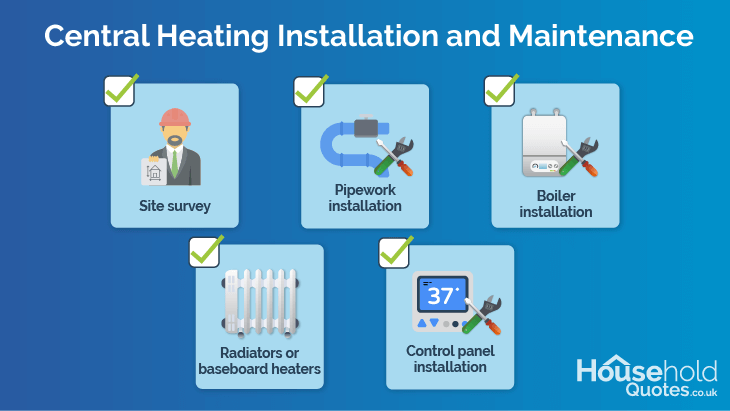
Central heating installation involves several steps, including:
- Site survey: To begin with, a qualified technician will thoroughly inspect your home to assess the space available, access points, and potential obstacles for installing the system components.
- Pipework: Afterwards, if your system uses forced-air distribution, pipework will be installed to channel heated air from the boiler to the various rooms in your home. This process involves measuring, cutting, and fitting the pipes, ensuring proper ventilation and air circulation.
- Heating device installation: The boiler, the core of the central heating system, will be installed in a designated area, such as a basement or utility room. This involves connecting the boiler to the pipework, gas lines, and electrical supply.
- Radiators or underfloor heating: If your system uses radiators or underfloor heating, these heat emitters will be installed in designated areas, ensuring proper spacing and accessibility.
- Control panel installation: Finally, the control panel, which regulates the temperature and operation of the system, will be installed in a convenient location, for example near the entryway to your home.
When do you need a new central heater system?
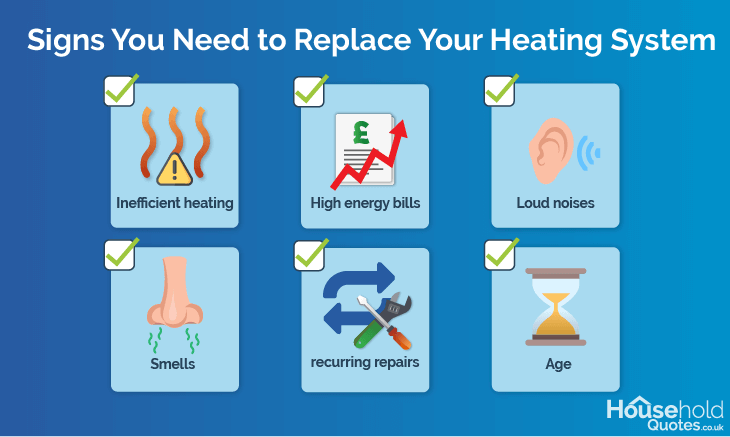
In general, several signs may indicate that you need a new central heating system. If you are experiencing any of the following problems, it is a good idea to have your system inspected by a qualified heating technician to determine if a new boiler is necessary.
- Inefficient heating: First and foremost, if your central heating system is not providing adequate heat or is taking longer than usual to warm your home, it may be inefficient and in need of replacement.
- High energy bills: If your energy bills are consistently higher than usual, it may be a sign that your central heating system is not operating efficiently.
- Loud noises: If your central heating system is making strange noises, such as rattling, banging, or hissing, it may be a sign of wear and tear and may need to be replaced.
- Recurring repairs: Also, if you are constantly having to make repairs to your central heating system, it may be worth considering replacing it with a newer, more efficient model.
- Age: Central heating systems typically have a lifespan of about 15-20 years. So, if your system is older than this, it is more likely to have problems and it may be time to consider replacement.
- Smells: This means that your boiler leaks CO (Carbon Monoxide) and poses extreme danger to your health and your home.
In case you notice any unusual smells coming from your boiler, don’t hesitate to take immediate action. Call the Gas Emergency Service on 0800 111 999 in England, Scotland, and Wales and 0800 002 001 in Northern Ireland. In the meantime, turn off all appliances, air your property and consult a doctor to make sure you or any members of your household don’t have CO poisoning.
However, remember that these are just general signs. The best way to know if you need a new central heating system is to have it inspected by a qualified technician. They will assess the condition of your system and make a recommendation based on your specific needs and budget.
Undoubtedly, finding a seasoned heating engineer can be a daunting task - something a busy homeowner like you simply doesn't have time for.
Luckily, Household Quotes can streamline the process for you. Complete our short form, in less than a minute, and get up to 3 quotes from reliable heating engineers near you. Our quotes are free and non-binding, just click below to get started.
- Quotes from local installers
- Payment by finance available
- Save up to £975
It only takes 30 seconds

FAQ
As a rule, the installation of a full central heating system takes anywhere from 4 to 8 days. It all depends on the size and complexity of the system, the size and layout of the home, and, of course, the installer.
Yes, plumbers can install central heating, but they might not be the best choice for the job. It’s best if you hand over the central heating installation to a certified HVAC (heating, ventilation, air conditioning) technician, as they have the expertise to install electrical components and gas-fired boilers.
No, usually you don’t need permission to install central heating. However, if you live in a historic building, you might need to acquire permission from the local planning authority.
- What is a central heating system?
- Types of domestic central heating systems in the UK
- How does a central heating system work?
- Costs of a central heating system for your home
- Environmental impact of your central heating system
- Central heating installation and maintenance
- When do you need a new central heater system?
- FAQ
